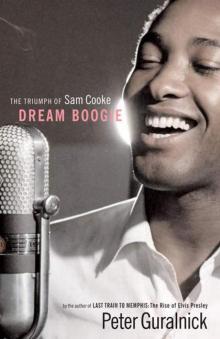Read Dream boogie: the triumph of Sam Cooke Storyline:
From Publishers WeeklyStarred Review. There's no real substitute for the sound of Sam Cooke's music, but the detailed descriptions of his recordings throughout this masterful biography are the next best thing to wearing headphones while you read. Guralnick's first book after a two-volume bio of Elvis honors Cooke's (1931–1964) musical genius, especially his ability to grasp the changing music scene of the late 1950s and early '60s. For those who only know the singer through his pop hits—"You Send Me"; "Twistin' the Night Away"—the extensive account of his childhood background in gospel music will prove fascinating, and the evocation of the harsh realities faced by African-American musicians touring the South a powerful reminder of just how explosive this music could be. Yet wide-ranging interviews reveal that behind Cooke's talent and energetic vocal style, many of his peers in the music biz saw a more troubling personality. The biography does not judge, but neither does it hold back on recounting Cooke's ruthless interactions with record companies or the deep rifts in his marriage to his former childhood sweetheart. Guralnick's revelation of the complicated man behind the music ultimately enables readers to rediscover songs like "A Change Is Gonna Come" as even more remarkable than before. Photos. (Oct. 18) Copyright © Reed Business Information, a division of Reed Elsevier Inc. All rights reserved. FromUntil Sam Cooke was shot dead in a Los Angeles motel, in 1964, at the age of thirty-three, his life had been an ascending series of crossover moves: he conquered the postwar gospel-music scene, scored bigger hits by moving into secular rhythm and blues, and then, after signing with R.C.A., in 1960, proceeded to go pop, and released a string of smooth, catchy singles that placed him on the cusp of mainstream superstar status. Guralnick, as in his biography of Elvis Presley, displays a feel for the culture that gave rise to the musician, and his account is a revelatory portrait of the rough-and-tumble yet familial world of black show business before and during the civil-rights era. In darker corners lurk the antecedents of today's gangster-rap subculture—racketeers who funded black record labels and tour packages, and performers like Johnny (Guitar) Watson, who made more as a pimp than he did singing. Copyright © 2006Pages of Dream boogie: the triumph of Sam Cooke :
